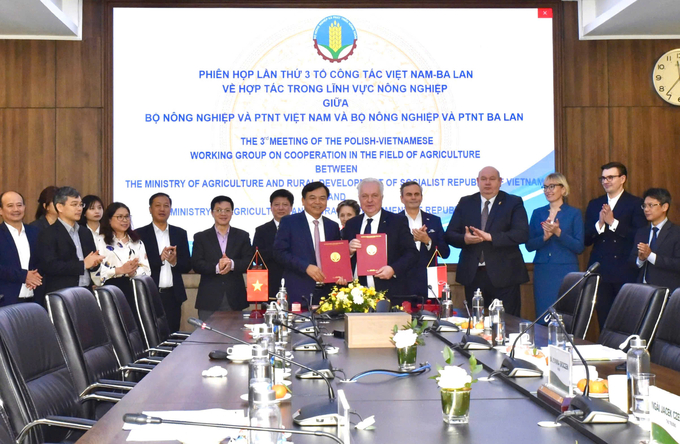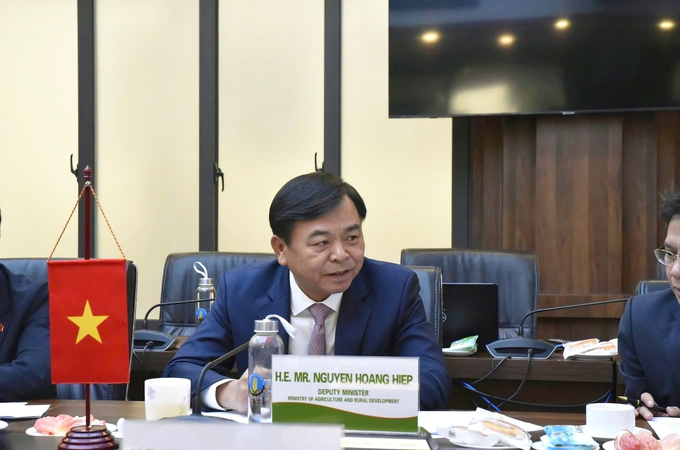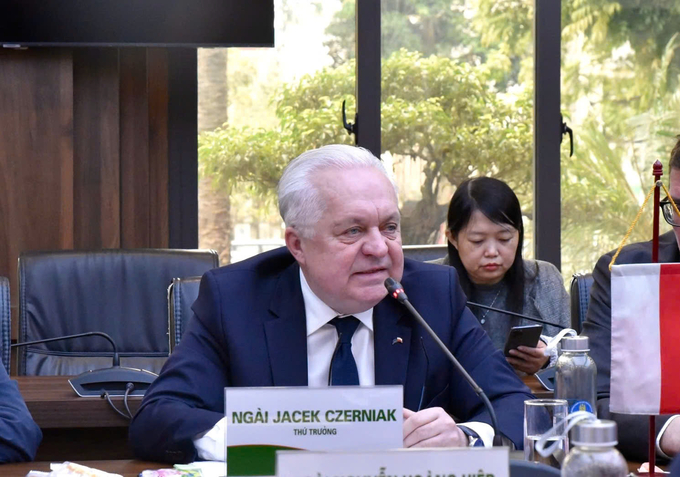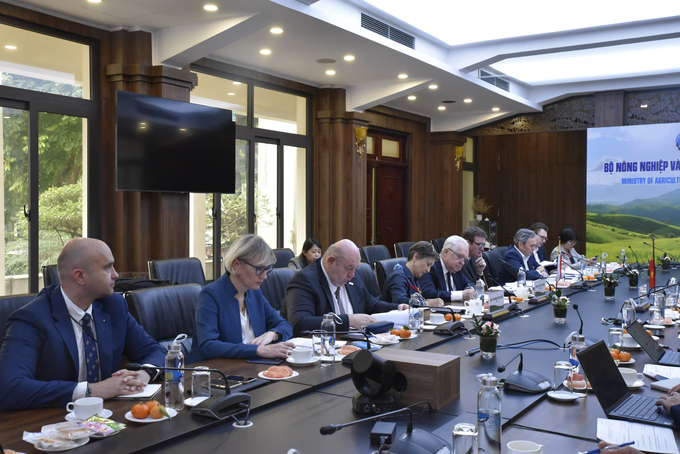June 16, 2025 | 21:08 GMT +7
June 16, 2025 | 21:08 GMT +7
Hotline: 0913.378.918
June 16, 2025 | 21:08 GMT +7
Hotline: 0913.378.918

Vietnam and Poland signed the report in promoting agricultural cooperation on 27 November. Photo: Kieu Chi.
On November 27, the third meeting of the Vietnam-Poland working group on agricultural cooperation was held under the co-chairmanship of Vietnamese Deputy Minister of Agriculture and Rural Development Nguyen Hoang Hiep and Polish Deputy Minister of Agriculture and Rural Development Jacek Czerniak.
The two sides reviewed the outcomes of agricultural cooperation between Vietnam and Poland, discussed the potential for developing agricultural and food trade between the two countries, and jointly adopted a report on the third meeting of the working group on agricultural cooperation.
Enhancing bilateral trade cooperation
Deputy Minister Nguyen Hoang Hiep stated: “In 2023, the two-way trade turnover between Vietnam and Poland reached USD 3.5 billion, with agricultural, forestry, and fishery trade accounting for over USD 180 million. This figure reflects the significant potential for further cooperation between the two countries.”

According to Deputy Minister, since the second session in June 2023, both sides have achieved significant accomplishments. Photo: Kieu Chi.
Deputy Minister Nguyen Hoang Hiep added that in terms of animal quarantine, Vietnam has granted licenses to 155 Polish companies to export meat and 25 companies to export seafood to Vietnam. Regarding plant quarantine, Vietnam is conducting pest risk analysis to allow the import of fresh blueberries from Poland. In terms of seafood, 505 Vietnamese enterprises are currently authorized to export to the EU, including the Polish market, with key products such as frozen salmon and sterilized canned fish.
Deputy Minister of Agriculture and Rural Development of Poland, Jacek Czerniak, emphasized that one of Poland's priorities is to develop sustainable agriculture, ensure food security, strategically focus on the application of modern equipment and digital technologies, and pay attention to environmental protection and emissions reduction.

Mr. Jacek Czerniak, Deputy Minister of Agriculture and Rural Development of Poland, speaking at the session. Photo: Kieu Chi.
Over the past five years, the value of exports from Poland to Vietnam has grown significantly, reaching EUR 175.5 million in 2023, a 14% increase compared to EUR 154 million in the previous year. Meanwhile, agricultural imports from Vietnam to Poland in 2023 amounted to nearly EUR 299 million.
Both sides aim to ensure balanced trade growth, not only in agriculture but also by expanding to other products to enhance overall trade turnover.
At the third session, Vietnam’s MARD agreed with Poland’s MARD to strengthen cooperation and address technical barriers in veterinary medicine, plant protection, animal husbandry, and other areas under their jurisdiction.
Specifically, both sides committed to intensifying coordination in document review, implementing an online licensing system, combating counterfeit certificates, and strictly handling violations in animal trade. These efforts aim to build trust and ensure that the exchange of goods is transparent, smooth, and reliable.
Additionally, Vietnam and Poland agreed to enhance information exchange, collaborate on disease control, and work to eliminate outbreaks amid major challenges such as avian influenza and African swine fever.

The Polish MARD affirmed its commitment to finalizing the establishment of quarantine requirements in coordination with Vietnam's Department of Animal Health. Photo: Kieu Chi.
In concluding the third session of the Vietnam-Poland working group, Deputy Minister Nguyen Hoang Hiep presented several proposals:
First, to effectively implement the EU-Vietnam Free Trade Agreement (EVFTA), both sides should organize more business forums and agricultural, forestry, and fisheries fairs to facilitate stronger connections between enterprises. Vietnam also proposed that Poland consider importing fresh fruits, canned fruits, and wood products from Vietnam, while supporting the enforcement of the EU Deforestation Regulation (EUDR).
Second, Vietnam expressed its hope that Poland, as the EU Chair in 2025, would actively support efforts to have the EU lift the IUU “yellow card” on Vietnam’s seafood industry, thereby boosting seafood trade with the European market.
Third, Vietnam proposed that the Polish government consider providing financial support and increasing concessional ODA loans for agricultural and rural development projects, as well as for building fishing vessels. The two ministries will collaborate to prepare proposals for concessional loans to submit to the governments of both countries, aiming to assist Vietnamese localities.
Fourth, Poland continues supporting the training of human resources by welcoming Vietnamese officials to participate in postgraduate programs in agriculture, forestry, post-harvest technology, agricultural product processing, fishing vessel construction, rural management, and development.
Translated by Kieu Chi

(VAN) The working delegation from the Ministry of Agriculture and Environment conducted an important trip to the Netherlands to strengthen strategic partnerships and sustainable development in the agricultural sector.

(VAN) The letter ‘A Plea from the Ocean’ not only evokes emotion but also awakens the human conscience to the responsibility of protecting life on Earth.

(VAN) The Department of Agriculture in South Africa has announced the country’s first mass vaccination of poultry to prevent local birds from contracting avian influenza.

(VAN) Establishment of the Mekong Delta Regional Agricultural Linkage Center, aiming for a closed value chain, deep processing, trading platforms, and international market connectivity.

(VAN) Gia Lai province has recently recorded 460 rare species of animals and plants, contributing to forest conservation and biodiversity planning in the region.

(VAN) Ms. Caroline Beresford, New Zealand Ambassador to Vietnam, expressed confidence that agricultural cooperation between Vietnam and New Zealand will develop sustainably, be climate-resilient, and promote gender equality.

(VAN) Vietnam reaffirms its commitment to international cooperation in fostering sustainable and responsible fisheries while ensuring resilient livelihoods for small-scale fishing communities.